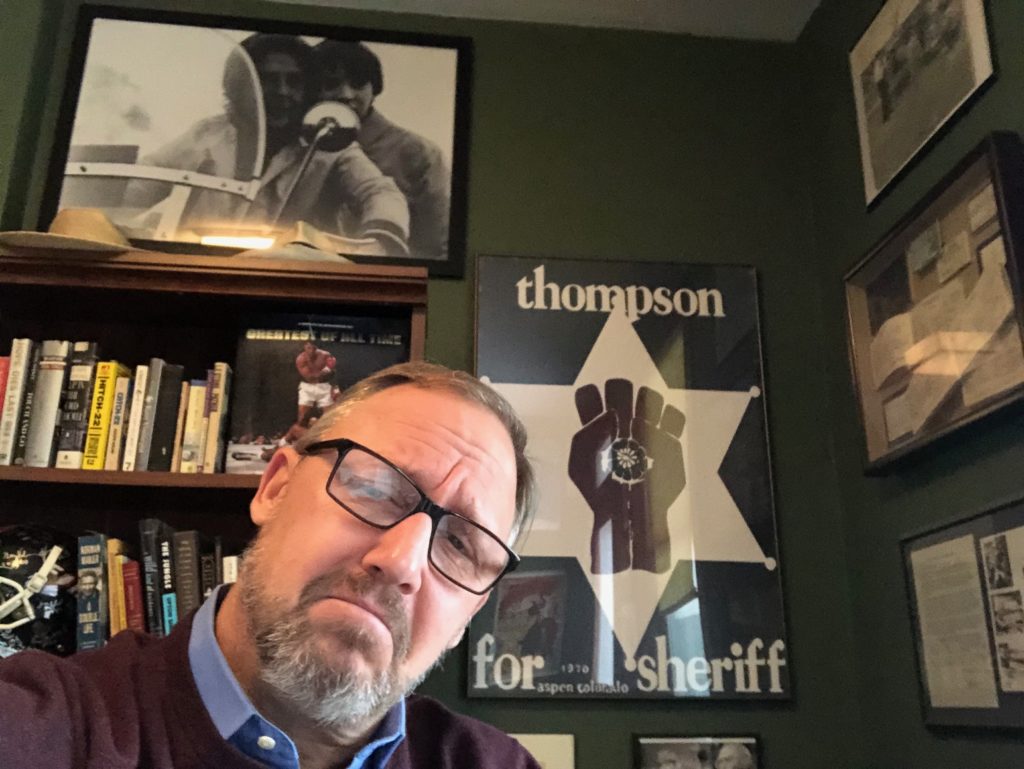My loathing of video-intermediated communication began with Skype, like 15 years ago. I covered my usual shame about my technophobia with curmudgeonly grouchiness. “I don’t want to have to dress up for a phone call.”
I resisted video yakking for years, despite the urgings of its proponents, who always got across the attitude that you were some sort of communication coward if you wanted to hide behind the phone. Didn’t you want to connect?
When I did get talked into a Skype call, usually by a European, I always had the heebie-jeebies. You’re not supposed to see yourself the whole time you’re having a conversation. (You’re supposed to think about yourself the whole time you’re having a conversation!)
Well I’ve spent a lot of time on Zoom this year, as you have. I’ve gotten used to it. Maybe I’ve even gotten good at it. I have a ring light that I calibrate to offset the changing ambient light through the window of my office, which I now refer to as a “studio.” I make steady eye contact with the green dot and pretend it’s your eyeball.
And I’ve developed a bunch of moves that I do that make it look like I’m listening, when in fact I’m either adjusting my ring light, regarding the way I look in my sexy-ass office or thinking about when I can have a drink.



When I talk to you on the phone, I’m far less of a jackass. In fact, all the energy I spend being a jackass on Zoom, I spend listening to you on the phone. “Zoom fatigue” has been written about a lot this year. I have not read any of that literature, because I know exactly what causes it: Pretending to listen, while actually trying to listen.
Obviously, Zoom is better than a phone for conference calls, because you can actually see everyone, and they have to keep their obscene gestures to themselves. I feel comforted, looking out at a Hollywood Squares screen of people who are consciously keeping their obscene gestures to themselves. (Also, a rusty wheelbarrow is better than a phone for conference calls.)
But for one-on-one conversations, the phone is the more intimate medium. When you’re listening to a great radio interview or podcast, do you find yourself wishing it was on TV? No, you don’t find yourself wishing anything. Because you’re listening in a way that you never listen to a TV interview, where part of your brain is always comparing the guest, favorably or unfavorably, to Mr. Potato Head.
Listening to the radio or a podcast, you’re significantly more likely to remember what was said. As Bill Maher says, “I don’t know it for a fact. I just know it’s true.” Or is it Jimmy Kimmel who says that?
Before scheduling business calls, I’ve begun offering the other person a choice: “Let me know if you prefer Zoom or phone.”
A correspondent replied the other day, “Does anyone prefer Zoom?”
It was liberating just to hear her say it.
For one-on-one chats, I’m starting to construct a Phone-First Default Policy—a loose rule, with wiggle room for the other person’s preference or for situational exceptions (a first meeting, or a happy hour with an old friend, or a new sweater that I want to show off).
But otherwise, reach me on my cell.
Watson. Can you hear me? The era of Zoom-shaming is over.
Love it, David!
Yes – aka the “videophonic stress” as outlined by David Foster Wallace circa 1996: https://ochuk.wordpress.com/2015/08/20/my-favorite-pieces-of-writing-excerpt-from-infinite-jest/
May I please associate myself with the excellent sentiments expressed here – completely, whole-heartedly and without reservation?